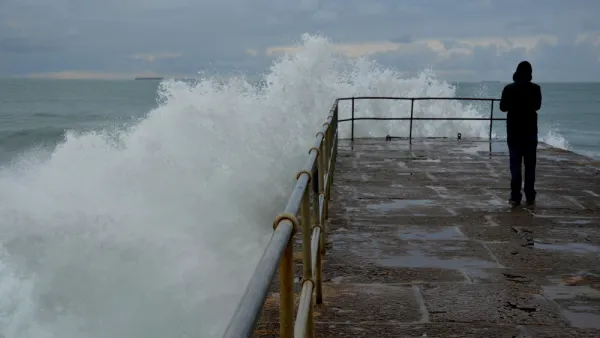Add this one to the "This is how they spend my tax dollars?!" file. Scott Huler exposes a ploy by legislators from 20 coastal North Carolina counties to outlaw effectively measuring and predicting the potential rise in sea level.
In an effort to head off the supposed harm to economic development caused by the likely 1-meter rise is sea levels by 2100 reported by a state-appointed science panel, the legislators have circulated Replacement House Bill 819.
According to Huler, "The key language is in section 2, paragraph e, talking about rates of sea level rise: 'These rates shall only be determined using historical data, and these data shall be limited to the time period following the year 1900. Rates of seas-level rise may be extrapolated linearly. ' It goes on, but there's the core: North Carolina legislators have decided that the way to make exponential increases in sea level rise – caused by those inconvenient feedback loops we keep hearing about from scientists – go away is to make it against the law to extrapolate exponential; we can only extrapolate along a line predicted by previous sea level rises."
"Which, yes, is exactly like saying, do not predict tomorrow's weather based on radar images of a hurricane swirling offshore, moving west towards us with 60-mph winds and ten inches of rain. Predict the weather based on the last two weeks of fair weather with gentle breezes towards the east. Don't use radar and barometers; use the Farmer's Almanac and what grandpa remembers."
Writing in the Charlotte Observer, Bruce Henderson reports that, "NC-20 Chairman Tom Thompson, economic development director in Beaufort County, said his members – many of them county managers and other economic development officials – are convinced that climate changes and sea-level rises are part of natural cycles. Climate scientists who say otherwise, he believes, are wrong."
Thanks to Kelly Bennett
FULL STORY: NC Considers Making Sea Level Rise Illegal

Analysis: Cybertruck Fatality Rate Far Exceeds That of Ford Pinto
The Tesla Cybertruck was recalled seven times last year.

National Parks Layoffs Will Cause Communities to Lose Billions
Thousands of essential park workers were laid off this week, just before the busy spring break season.

Retro-silient?: America’s First “Eco-burb,” The Woodlands Turns 50
A master-planned community north of Houston offers lessons on green infrastructure and resilient design, but falls short of its founder’s lofty affordability and walkability goals.

Test News Post 1
This is a summary

Analysis: Cybertruck Fatality Rate Far Exceeds That of Ford Pinto
The Tesla Cybertruck was recalled seven times last year.

Test News Headline 46
Test for the image on the front page.
Urban Design for Planners 1: Software Tools
This six-course series explores essential urban design concepts using open source software and equips planners with the tools they need to participate fully in the urban design process.
Planning for Universal Design
Learn the tools for implementing Universal Design in planning regulations.
EMC Planning Group, Inc.
Planetizen
Planetizen
Mpact (formerly Rail~Volution)
Great Falls Development Authority, Inc.
HUDs Office of Policy Development and Research
NYU Wagner Graduate School of Public Service




























